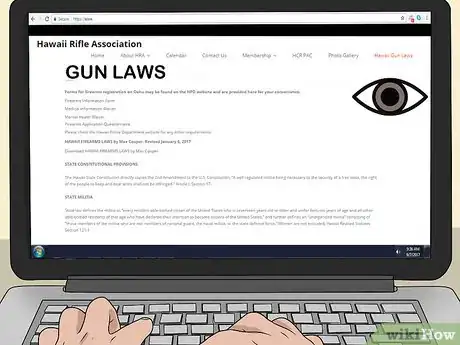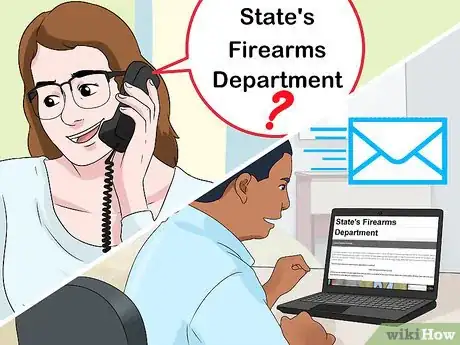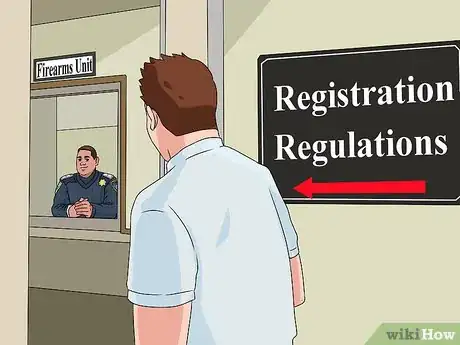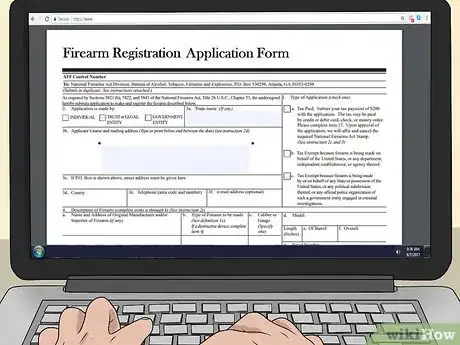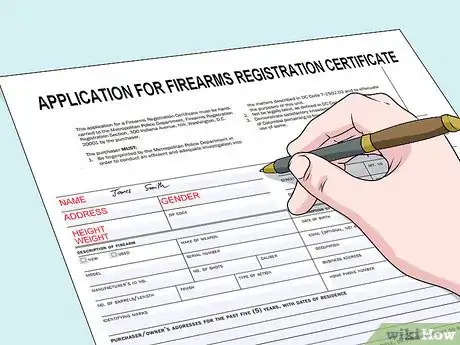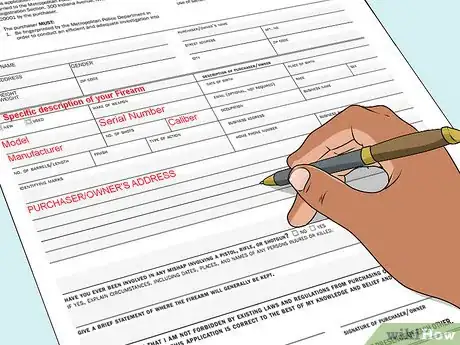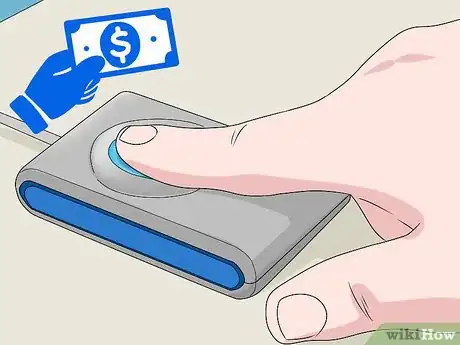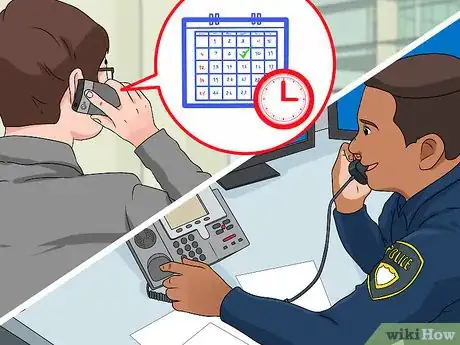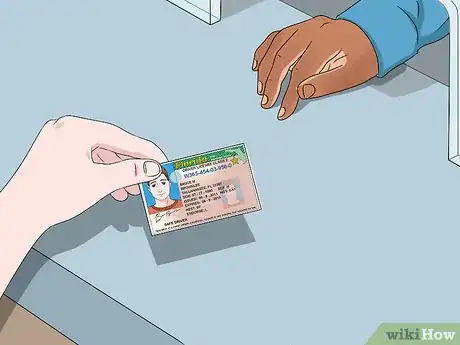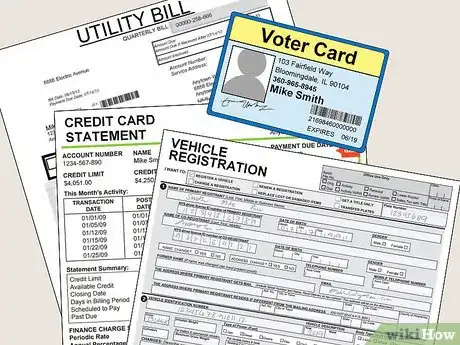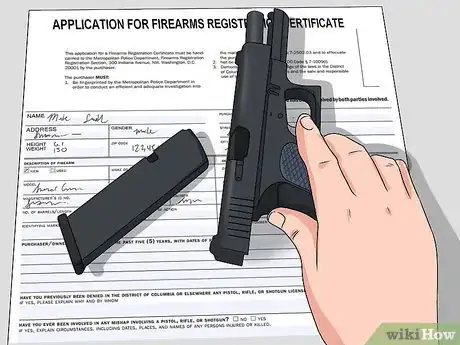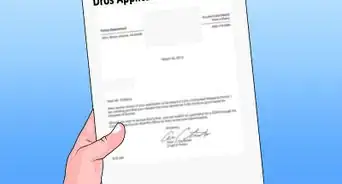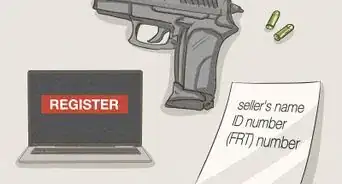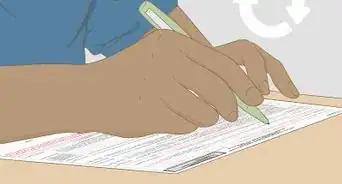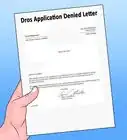This article was co-authored by Bryan Villella. Bryan Villella is the Lead Firearms Instructor and Owner of Don't Be A Sitting Duck in Kissimmee, Florida. Bryan has nine years of professional experience and is an NRA and Florida State Certified “K” Instructor. He leads certified training courses necessary to get licensed through the state to work in the private security field. He prioritizes safety and building comfortable environments for people to learn skills safely.
This article has been viewed 99,014 times.
If you live in a state that requires you to register your gun, find out all the requirements to make the process easy. Be ready to present identifying information about yourself and your firearm when you submit your application. Be as prompt and cooperative as you can during the process to ensure that it goes smoothly.
Steps
Researching Your State's Gun Laws
-
1Look up your state's gun laws online before purchasing a gun. Depending on the state you live in, gun registration may or not be necessary. Visit your state's website to get information about its particular gun regulations. If registration is required, read up on the specific requirements for the application process in the section of the website dealing with licensing and regulatory affairs. .[1]
- Hawaii and the District of Columbia, for instance, require registration for all guns.
- New York requires the registration of all handguns.
- California, Connecticut, Hawaii, Maryland, New Jersey, and New York require the registration of pre-ban assault weapons and 50 caliber rifles.
- States like Florida, Georgia, and Idaho prohibit registries of firearms.
- Hawaii requires all firearms to be registered within 5 days of their acquisition.
-
2Contact your state's firearms department by phone or email for information. If your state's website does not provide the information you need about gun registry, contact your state office directly. Look up the department's contact information to get an email address or phone number to communicate with a representative. This information may be listed under a link titled, "Contact Us," "Questions," or something similar.
-
3Inquire about registration regulations at your local police department. Some state laws require gun owners to register their guns in person at a local police station. Whether or not this applies to your state of residence, law enforcement will be able to provide you with information about gun regulations in your area. Phone or visit your local police department to find out if and how you have to register your gun.
Filling Out Your Application
-
1Obtain a gun registration application form in advance, if possible. Depending on the state you live in, you may be able to obtain a registration form online or in person to complete in advance. Doing so will save you time when you appear at your local law enforcement station.[2] In certain states, you will have to complete the form in person when you show up to register your firearm.[3]
- In Hawaii, for instance, you can download an application form online or obtain one from your local police department to complete in advance.
- In the District of Columbia, you must complete the full registration application at your local police department.
-
2Give your name, address, and other identifying information. While each state has its own registration forms for firearms, the basic information required is the same. Provide your full, legal name and current address. Other identifying information, such as your gender, height, and approximate weight, may be requested on the form.[4]
-
3Provide a specific description of your gun. After providing details about yourself, you will have to detail the specific features of your gun. List the name of the gun's manufacturer, its serial number, model, type of caliber or gauge, and any other information requested. You will likely be asked to provide the name and location of the source you got the gun from, also.[5]
-
4Pay a fingerprinting fee, if required. Depending on where you are registering a gun, you may be required to submit a fingerprint. This will require you to pay a fingerprinting fee, payable in person at your local law enforcement office. Call ahead to find out your state's requirements and what forms of payment will be accepted, if needed.[6]
- Hawaii, for example, requires you to pay the fee by money order or cashier's check only.
Submitting Your Application
-
1Book an appointment at the police station, if necessary. Some law enforcement stations will require you to book an appointment to register your gun. Call ahead to reserve a time slot, or ask if there are hours open for walk-in appointments. If you have to miss an appointment, be sure to notify the station immediately.[7]
-
2Show a valid form of identification. To register a gun you must be 21 years of age. Bring a valid piece of I.D., like a driver's license, passport, or green card, to present with your application. If you are a foreign born applicant, present your naturalization papers and/or a passport.
-
3Present a proof of address. You will need to prove that you actually reside in the region you are registering your gun in. Bring a piece of correspondence like a utility bill, voter card, credit card statement, or vehicle registration. The correspondence should have been received within the last 90 days to show that it is still applicable.
-
4Bring your unloaded gun when submitting your application. To process your application, a law enforcement official will have to inspect your firearm in person. Remove any ammunition from your gun and place it in an enclosed container. Bring the gun to your local police department or registration office when you complete your registration.[8]
Expert Interview

Thanks for reading our article! If you'd like to learn more about registering a gun, check out our in-depth interview with Bryan Villella.
References
- ↑ http://lawcenter.giffords.org/gun-laws/policy-areas/gun-owner-responsibilities/registration/#federal
- ↑ http://honolulupd.org/information/index.php?page=gunmain
- ↑ https://mpdc.dc.gov/node/763182
- ↑ http://lawcenter.giffords.org/gun-laws/policy-areas/gun-owner-responsibilities/registration/#state
- ↑ http://lawcenter.giffords.org/gun-laws/policy-areas/gun-owner-responsibilities/registration/#state
- ↑ http://www.hawaiipolice.com/services/firearm-registration#registration
- ↑ http://www.hawaiipolice.com/services/firearm-registration#registration
- ↑ http://www.hawaiipolice.com/services/firearm-registration#registration
Community Q&A
-
QuestionHow can I tell if my firearm has been registered?
 Galasy4969Top AnswererIf your state does have a registry, you'll likely need to take up your question with the sheriff's department. If you purchased the firearm from a commercial dealer, it's likely that they registered it for you; however, this is not a given.
Galasy4969Top AnswererIf your state does have a registry, you'll likely need to take up your question with the sheriff's department. If you purchased the firearm from a commercial dealer, it's likely that they registered it for you; however, this is not a given. -
QuestionIs there a federal gun registry?
 Drew Hawkins1Community AnswerNo, there is no national or federal gun registry. In fact, there are have been bills introduced that sought to make it illegal for the federal government to create a national registry. However, some states have provided their gun registries to the federal government.
Drew Hawkins1Community AnswerNo, there is no national or federal gun registry. In fact, there are have been bills introduced that sought to make it illegal for the federal government to create a national registry. However, some states have provided their gun registries to the federal government. -
QuestionWhich states require gun registration?
 Drew Hawkins1Community AnswerOnly 6 states and the District of Columbia require gun owners to register some or all types of firearms. Hawaii and Washington D.C. require all firearms to be registered, while California only maintains a database of gun transfer records. New York only requires registration of handguns.
Drew Hawkins1Community AnswerOnly 6 states and the District of Columbia require gun owners to register some or all types of firearms. Hawaii and Washington D.C. require all firearms to be registered, while California only maintains a database of gun transfer records. New York only requires registration of handguns.
About This Article
If your state requires you to register your gun, you'll need to submit an application to your local law enforcement office. Call your local police station to see if you can pre-fill out your application or if you need to make an appointment to meet with an official. If you can fill out your application ahead of time, look online for a registration form and fill it out. You could also go to your local police station to ask for one. Bring your unloaded gun, your ID, and proof of your address with you to the police station and make sure all of the fields on your application are filled out. Turn in all of the documents and present your gun to the law enforcement official. Depending on your location, you may have to pay a fee to register your gun and possibly to have your fingerprint taken. For tips about how to look up your state’s gun laws, keep reading!
